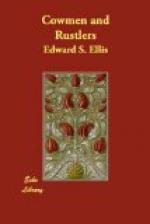A hard look crossed the face of the rustler and his thin lips compressed as he shook his head.
“Yes, that’s what’s left of Jack Perkins; he was my pard.”
“How did it happen?”
“How did it happen! A pretty question for you to ask. He was killed by the stockmen less than an hour ago.”
“But they didn’t ride hither and shoot him down, I am sure.”
“I don’t know what you can be sure of,” said Vesey, ominously. “Jack and I were riding along peaceable like, when we heard horsemen behind us. We didn’t pay any attention to them till we got home and Jack slipped off his horse. I concluded to stay in the saddle until the fellows came up and I had a talk with them. They were Capt. Asbury and his stockmen, and the first thing they called out was an order for us to throw up our hands.
“Well,” continued Vesey, grimly, “we aren’t in that kind of business, and the next thing the guns were popping all around us. Jack had nerve. I wish the poor fellow had stayed in the saddle; but his horse scooted off, and he stood right there where he fell, without a leaf to shelter him, and pumped the lead into those stockmen, who were mean enough to shoot the brave fellow in his tracks without giving him a chance for life.”
“You told me they ordered him to surrender before the firing began.”
“So they did, that they might shoot him down the easier. I had a hot chase with them, and it was a pretty close call for me; but they didn’t keep up the hunt for long. You would think,” added Vesey, bitterly, “that they would have been satisfied with dropping poor Jack, without burning down our home; but that is the style of the stockmen.”
Here was a representative of each of the factions, or associations, so hostile to each other. The rustler knew Monteith Sterry, and must have felt a consuming resentment toward him. His words and manner indicated, too, that he was not averse to a quarrel. He had fought the stockmen more than once, and, with the memory of the recent collision and the advantages on the other side, he welcomed the chance of a conflict on anything like equal terms.
Monteith did not stand in any personal fear of the famous rustler, and was fully armed and on the alert. Without seeming to do so, he kept a watch on the man, but he disliked the thought of a personal encounter with him. The scene, the surroundings, and his own nature, revolted, and he resolved to submit to all that it was possible to bear before falling back on the last resort.
“No doubt,” said Sterry, “there has been injustice on both sides, and stockmen as well as rustlers have done things for which there is no justification; I hope the trouble will soon end.”
“It will end as soon as we get justice.”
“Yes,” Sterry could not help retorting, “for if justice were done to you rustlers none would be left. However,” he hastened to add, “there is no reason why you and I should quarrel, Vesey; I had no share in the death of your friend; and if the case is as you represent it, he was more sinned against than sinning.”




